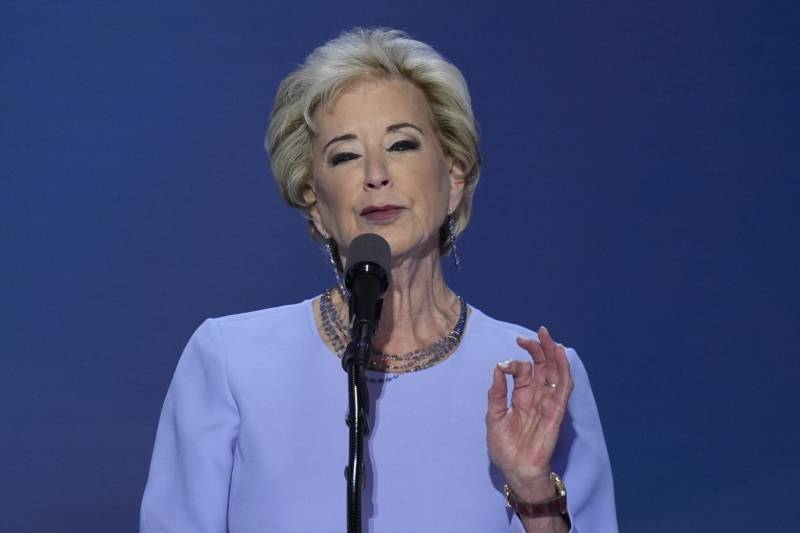Regardless of the fate of the department, the contrast between President Joe Biden’s and Trump’s education agendas — and between McMahon and current Secretary of Education Miguel Cardona — could not be wider.
Cardona is a lifelong educator, becoming secretary after a career as a teacher, principal, district administrator and state commissioner of education. McMahon spent most of her career building the WWE, founded with her husband, Vince McMahon.
Cardona’s net worth is estimated by Forbes magazine to be $1 million, most of it tied up in his principal residence, retirement savings and a 529 college savings account for his children. By contrast, Forbes places McMahon and her husband’s net worth at $2.5 billion.
The only thing they seem to have in common is that they are both from Connecticut.
However, even though McMahon has a slim resume regarding education, she is not entirely an education neophyte. She studied to become a French teacher in college. She has been a trustee of Sacred Heart College, a Catholic college in Fairfield, Connecticut, for years. She was appointed to the Connecticut State Board of Education in 2009, although she left after a year to run for the U.S. Senate in 2010 and again in 2012 — both times unsuccessfully.
McMahon is more of a traditional conservative Republican than several of Trump’s other Cabinet nominees. In some ways, she is more similar to Betsy DeVos, another billionaire, who was Trump’s first secretary of education. However, unlike DeVos, she has had experience in government as head of the Small Business Administration during Trump’s first term.
In 2019, she left that post — not under a cloud or fleeing vitriol from Trump, like many others in his administration — to head the America First PAC, which raised funds for Trump’s reelection bid in 2020.
On the explosive issue of “school choice,” publicly, at least, she has mostly called for expanding charter schools, rather than taxpayer-funded vouchers. “I am an advocate for choice through charter schools,” she declared in her 2010 campaign for Senate.
She also has some bipartisan instincts, even getting support from the Democratic senators she had previously run against when they had to approve her nomination to head the Small Business Administration. Sen. Richard Blumenthal called her “a person of serious accomplishment and ability,” and Sen. Chris Murphy described her as a “talented and experienced businessperson.”
As SBA administrator, she drew high praise from some Democrats for increasing loans to women-owned businesses and for making the agency more efficient, including from then-Sen. Ben Cardin (D-Md.), the ranking member of the Small Business and Entrepreneur Committee.
Another sign of her bipartisan inclinations came in a September commentary in The Hill newspaper when she argued for a radical revision of the Pell Grant, the main form of federal student financial aid.
While most Pell Grants go to full-time students, McMahon argued that the grant should also be available to students enrolled in “high-quality, shorter-term, industry-aligned education programs that could lead to immediate employment in well-paying jobs.”
To that end, she endorsed a bill known as the Workforce Pell Act, sponsored by lawmakers usually on far opposite sides of the political aisle, including Reps. Virginia Foxx (R-N.C.), Elise Stefanik (R-N.Y.), Mark DeSaulnier (D-Calif.) and Bobby Scott (D-Va).
Arguably, one of her key qualifications is that she and Trump have a positive relationship. Unlike many who served in his first administration and left reviled by their former boss, when she stepped down as SBA administrator, Trump praised her as a “superstar.” “Just so smooth,” he said. “She’s been one of our all-time favorites.”
However, her most important credential may well be her role as chair of the board of the America First Policy Institute, which she helped start.
Its 150-person staff includes well-known Trump staffers like Kellyanne Conway and its executive director, Chad Wolf, the former secretary of homeland security. Pam Bondi, the head of the institute’s legal arm, was just nominated by Trump to be attorney general in place of Matt Gaetz, who withdrew his nomination.
Like Project 2025, the conservative blueprint issued by the Heritage Foundation (which Trump has disavowed and said he had no role in crafting), the America First Policy Institute has also drawn up a similar detailed policy framework, including one on education. Yet the institute has not done much to publicize its proposals, which Trump has reportedly appreciated.
The institute draws a sharp contrast between its “America First” policies and what it calls “America Last” policies championed by Democrats.
“America Last” policies, it argues, “prioritize radical ideologies and failing public schools.” These include promoting “transgenderism” and “radical ideologies over core subjects” while fighting “school choice expansion” and parent notification policies regarding curriculum and gender identification.
The institute calls for reinstating Trump’s 1776 Commission to promote “patriotic civic education” and removing critical race theory and diversity, equity and inclusion from what it alleges are requirements for federal grants.

